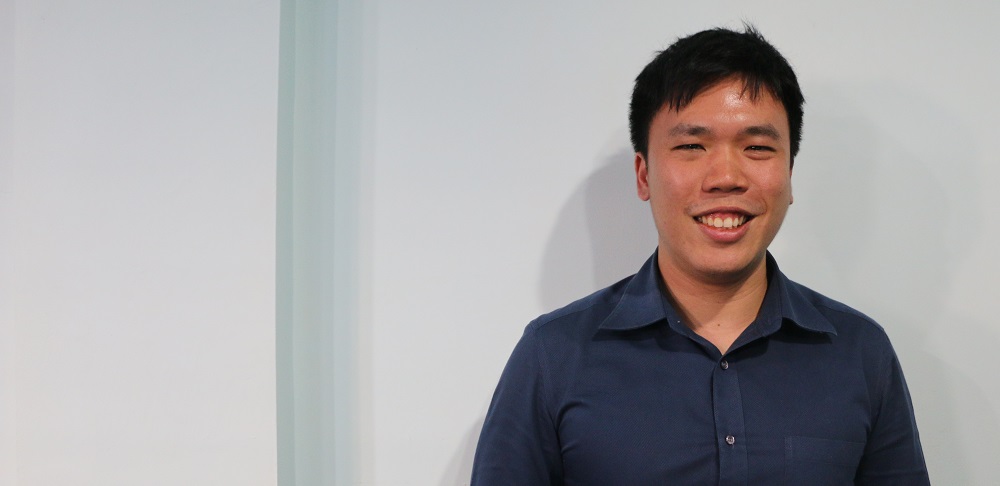Not all relationships have happy endings, as Darryl Lim knows all too well. When the recent NUS graduate – who’s now a full-time English teacher – experienced heartbreak a few years ago, he decided to channel his energy into his art, and wrote a play about what he went through. The 20-minute piece, titled Split, made its debut as part of NUS Dramafest in 2015. But Darryl knew that there’s a lot more he could explore, and so he spent the following year working hard to flesh it out into a full-length production. After a lot of devising, writing, and workshopping, the revised and updated version opens at Centre 42 on 5 November, but before that, we catch up with him to chat about his work, his process, and his metaphorical “cats”.
Why did you decide to title your play Split?
“Split” can be defined as social separation in general, and that’s what I planned to explore in the first place. So, how breakups or fall-outs happen between friends, parents, children, partners, and cause an emotional split between people. And it’s about how sometimes, they cannot get over it.
The first time you staged the work was at the NUS Dramafest in 2015 – what was that version about?
I centred the entire piece on a breakup, and it’s quite a personal story. I had an almost all-male cast – all seven guys all represent myself, and then there’s the girl. The guys represent different parts of the brain – the logical side, the emotional side, the provocative side, and… yeah. That first staging was based on the five stages of grief.
Would you say that grieving for the end of a relationship can be similar to grieving for someone who’s passed away?
To me, social separation can feel similar to the death of a loved one in terms of letting go, and seeing someone slowly leave your life. That’s why in the first version, you just see this guy descending into hell – depression is the fourth stage of grief – until he accepts everything, and the last word of the play was “paradise”.
Is this second staging very different from the first?
Yeah, it’s very different because I felt that the first one was very self-indulgent, so this time I branched out. The six actors this time around are all very close friends of mine, so they shared with me the separation that they’ve experienced. Through those informal interviews and a series of improvisation exercises I did with them, I crafted a story and created the play. So in that sense it can be seen as a devised work.
What does this story explore, then?
You know the thought experiment about the cat in the box? I used that as a metaphor. It’s something quite personal to me, because when a lot of us go through bad times in our relationships, there are certain things that we don’t want to confront. I call those things “the cat” – because if you confront “the cat” and you realise that it’s dead, then that’s it. So some of my characters decide not to confront the cat and leave with the possibility that it’s still alive, and that’s what keeps them going in a bittersweet kind of way.
You mentioned that the play is based on a very personal story – would you say that that’s your way of confronting your “cat”?
In a way, yes. I realised the power of theatre as a creator, because there were a lot of issues that were bothering me, but I was forced to open up the box and see that “the cat” was, really, dead.
Is this the first time that you’re staging a professional work?
Yeah, the rest of the plays I did were when I was still a student. I started off at Victoria Junior College, then went to NUS where I did Theatre Studies and Literature, and I wrote a musical there – but that’s a hall musical. I worked with Natalie [Hennedige] for a while, and the first play that I wrote was under a module taught by Huzir [Sulaiman]. Every time I write, I thank him for having given me the insight into creating a world of my own.
What are some of the challenges that you faced in staging the play outside of school this time?
Monetary concerns! It’s superficial, but it’s quite significant because even though [NAC’s grant platform] Matchbox is supporting me, I’m still forking out a bulk of my salary every month for this. But my aim in doing theatre is just to create and to bring the stories of my cast to life, so I have no regrets about throwing out the money.
What do you hope the audience can take away from Split?
I want them to overcome their fears and insecurities of not wanting to confront the “cats” in their relationships. There’s a character in the play who wreaks havoc in everyone’s lives, and my hope is that the audience would look at her in the end and say, bring it on – you can’t do anything to me because I will confront “the cat” no matter what you do.
Interview by Gwen Pew on 27 October 2016
Find out more about Split here, and catch the show at Centre 42 on 5 & 6 November 2016.






